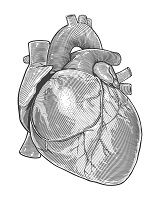Diabetics Do Better with Arteries-Only CABG
Diabetics who need CABG surgery have better outcomes when surgeons perform total arterial revascularization.

A less common procedure for coronary artery bypass grafting (CABG) may give diabetic patients longer life and long-term outcomes.
In an analysis of 63,000 cardiac surgery cases from the Australian and New Zealand Society of Cardiothoracic Surgeons (ANZSCTS) database, researchers found a statistically significant difference between those who had conventional bypass surgery and those who had total arterial revascularization (TAR) in which the surgeon uses only arteries to create the bypass. Conventional CABG generally uses one artery and veins to create the brief.
The team identified 34,181 patients who underwent some form of CABG between 2001 and 2012. Of these, 11,642 (34.1%) had diabetes. Of this group, 3,785 (32.6%) had TAR and 7,847 (67.4%) had CABG. To do the analysis, they compared a subset of 2,017 patients who were diabetic and had CABG using only arteries and 1,967 patients who were diabetic and had conventional CABG.
After a mean follow-up of 4.9 years, they found perioperative mortality (including the 30 days after surgery) was similar for both groups (1.2% for TAR and 1.4% for non-TAR), but late mortality was lower among diabetic patients who had TAR (10.2% vs. 12.2%, which was statistically significant. Of every 100 patients, 4 more were alive at 10 years out when arteries are used (82% vs. 78%, respectively.
At the same time, no additional complications occurred when TAR/CABG was used compared with traditional CABG. Complications generally include angina, heart attack, heart failure, and hospital readmissions.
In the U.S., conventional CABG has been performed for more than 50 years. It is one of the most common surgeries, with about 400,000 performed each year according to the Centers for Disease Control and prevention. Currently only 5 percent of patients who undergo CABG receive multiple arterial grafts.
"With the incidence of diabetes increasing in the United States, happening together with the continued improvement in life expectancy, it is probable that there will be more and more diabetic patients requiring CABG surgery in the future," said James Tatoulis, MD, FRACS, Professor of Cardiothoracic Surgery at the Royal Melbourne Hospital in Australia in a statement, speaking about the applicability of the study in the U.S. "Thus, the superiority of TAR/CABG will assume progressive importance."
He predicted that more patients could benefit from this type of surgery and experience a longer life, a better quality of life, and lower medical costs. Moreover, he added, "TAR/CABG is definitely within each cardiothoracic surgeon's ability and should be part of their repertoire.”
The study was presented at the Fifty-Second Annual Meeting of The Society of Thoracic Surgeons, Phoenix, AZ, Jan 23—27, 2016 and published in the Annals of Thoracic Surgeons online ahead of print July 14.